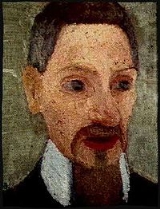
]; 4 December 1875 – 29 December 1926), better known as Rainer Maria Rilke, was a Bohemia
n–Austrian
poet. He is considered one of the most significant poets in the German language. His haunting images focus on the difficulty of communion with the ineffable in an age of disbelief, solitude, and profound anxiety: themes that tend to position him as a transitional figure between the traditional and the modernist
poets.
He wrote in both verse and a highly lyrical prose.
Just as language has no longer anything in common with the thing it names, so the movements of most of the people who live in cities have lost their connexion with the earth; they hang, as it were, in the air, hover in all directions, and find no place where they can settle.![]()
Du im Vorausverlorne Geliebte, Nimmergekommene,nicht weiß ich, welche Töne dir lieb sind.Nicht mehr versuch ich, dich, wenn das Kommende wogt,zu erkennen.![]()
I am much too alone in this world, yet not aloneenoughto truly consecrate the hour.I am much too small in this world, yet not smallenoughto be to you just object and thing,dark and smart.I want my free will and want it accompanyingthe path which leads to action;and want during times that beg questions,where something is up,to be among those in the know,or else be alone.![]()
The work of the eyes is done. Go now and do the heart-work on the images imprisoned within you.![]()
He was a poet and hated the approximate.![]()
Death is the dies of life which is turned away from us.![]()
Make your ego porous. Will is of little importance, complaining is nothing, fame is nothing. Openness, patience, receptivity, solitude is everything.![]()
Everywhere I am folded, there I am a lie.![]()

